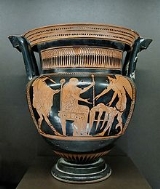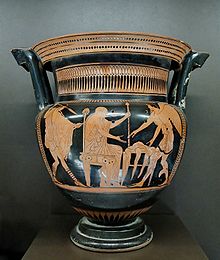
Boreads
Encyclopedia
- For the social fraternity nicknamed "Zetes", see Zeta PsiZeta PsiThe Zeta Psi Fraternity of North America was founded June 1, 1847 as a social college fraternity. The organization now comprises about fifty active chapters and twenty-five inactive chapters, encompassing roughly fifty thousand brothers, and is a founding member of the North-American...

Greek mythology
Greek mythology is the body of myths and legends belonging to the ancient Greeks, concerning their gods and heroes, the nature of the world, and the origins and significance of their own cult and ritual practices. They were a part of religion in ancient Greece...
, were Calaïs (Κάλαϊς) and Zetes (also Zethes) (Ζήτης). They were the sons of Boreas and Oreithyia
Oreithyia
Orithyia ; ) was the daughter of King Erechtheus of Athens and his wife, Praxithea, in Greek mythology. Her brothers were Cecrops, Pandorus, and Metion, and her sisters were Procris, Creusa, and Chthonia....
, daughter of King Erechtheus
Erechtheus
Erechtheus in Greek mythology was the name of an archaic king of Athens, the re-founder of the polis and a double at Athens for Poseidon, as "Poseidon Erechtheus"...
of Athens
Athens
Athens , is the capital and largest city of Greece. Athens dominates the Attica region and is one of the world's oldest cities, as its recorded history spans around 3,400 years. Classical Athens was a powerful city-state...
. Due to being sons of the north wind they were supernaturally gifted in different ways (depending on changes in the story from being passed down through generations and cultures) either being as fast as the wind or able to fly, having wings either on their feet or backs, depending on the myth.
They were Argonauts
Argonauts
The Argonauts ) were a band of heroes in Greek mythology who, in the years before the Trojan War, accompanied Jason to Colchis in his quest to find the Golden Fleece. Their name comes from their ship, the Argo, which was named after its builder, Argus. "Argonauts", therefore, literally means...
and played a particularly vital role in the rescue of Phineas
Phineas
In Greek mythology, Phineas was a Phoenician King of Thrace.The name 'Phineas' or 'Phineus' may be associated with the ancient city of Phinea on the Thracian Bosphorus.-Phineas, Son of Agenor:...
from the harpies
Harpy
In Greek mythology, a harpy was one of the winged spirits best known for constantly stealing all food from Phineas...
. They succeeded in driving the monsters away but did not kill them, at a request from the goddess of the rainbow, Iris
Iris (mythology)
In Greek mythology, Iris is the personification of the rainbow and messenger of the gods. As the sun unites Earth and heaven, Iris links the gods to humanity...
, who promised that Phineas would not be bothered by the harpies again. As thanks, Phineas told the Argonauts how to pass the Symplegades
Symplegades
The Symplegades or Clashing Rocks, also known as the Cyanean Rocks, were, according to Greek mythology, a pair of rocks at the Bosphorus that clashed together randomly. They were defeated by Jason and the Argonauts, who would have been lost and killed by the rocks except for Phineas' advice. Jason...
. It is said that the Boreads were turned back by Iris at the Strophades. The islands' name, meaning "Islands of Turning", refers to this event.
Their death was said to be caused by Heracles
Heracles
Heracles ,born Alcaeus or Alcides , was a divine hero in Greek mythology, the son of Zeus and Alcmene, foster son of Amphitryon and great-grandson of Perseus...
on Tenos in revenge for when they convinced the Argonauts to leave him behind as he searched for Hylas
Hylas
In Greek mythology, Hylas was the son of King Theiodamas of the Dryopians. Roman sources such as Ovid state that Hylas' father was Hercules and his mother was the nymph Melite, or that his mother was the wife of Theiodamas, whose adulterous affair with Heracles caused the war between him and her...
.
Other sources imply that the sons of Boreas died chasing the harpies, as it was fated that they would perish if they failed to catch those they pursued. In some versions, the harpies drop into the sea from exhaustion, and so their pursuers fall as well.
Sources
- Apollonius Rhodius, Argonautica I, 211-223.
- Apollodorus, Bibliotheke I, ix, 21; III, xv, 2.

